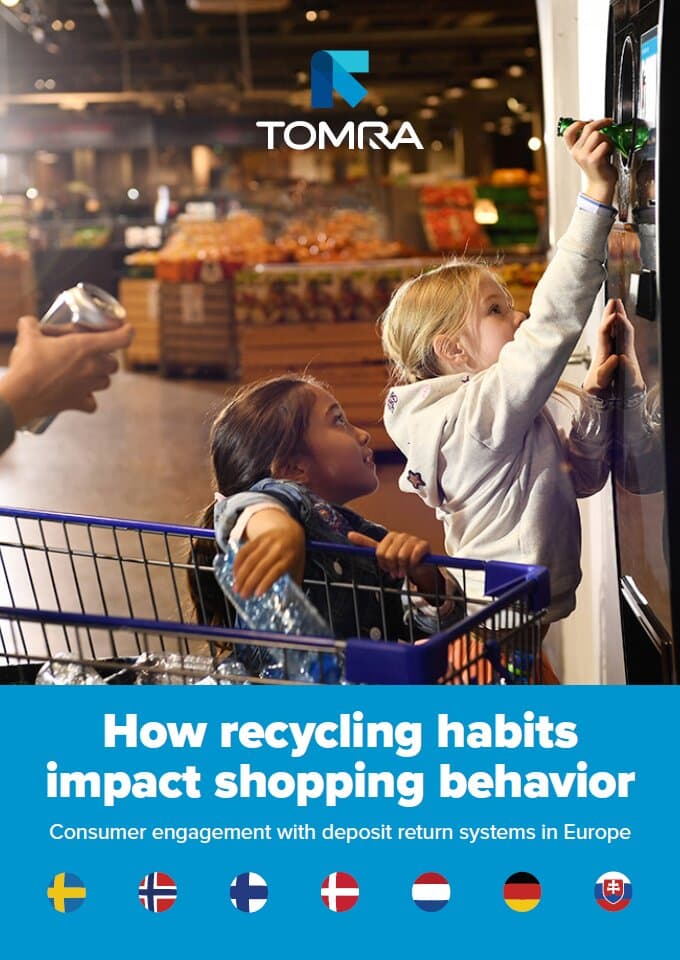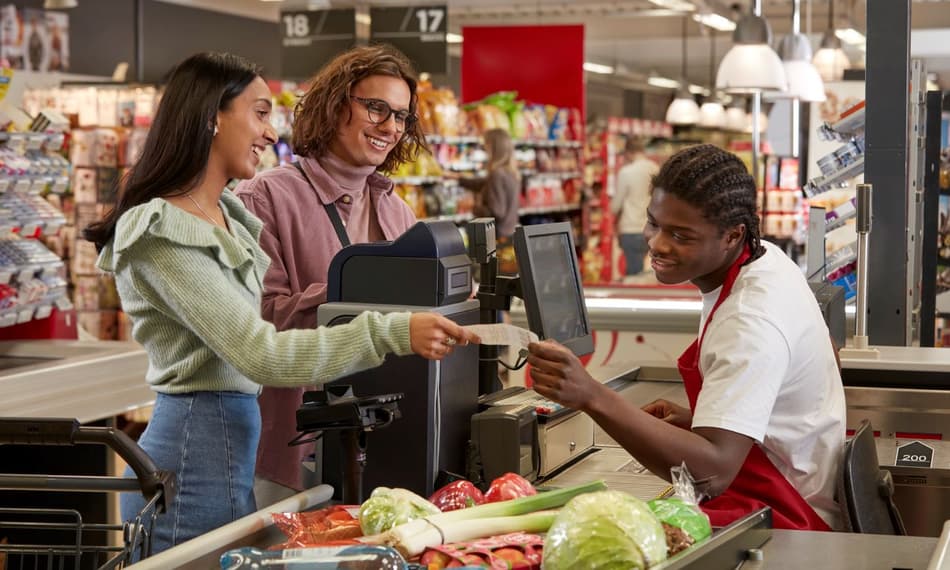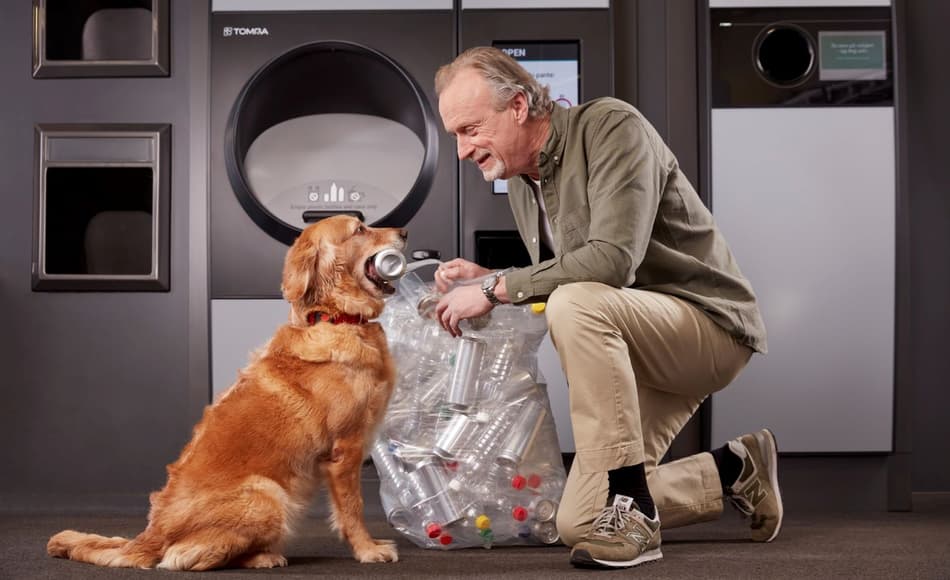87% of drink container recyclers spend their deposit refund in store, new survey finds
Recyclers factor in the state of a store’s reverse vending facilities when they decide where to return their empty drink containers for recycling, new research has found. A huge 87% of respondents put their deposit refund towards grocery purchases, and this was even higher in several specific countries.
The findings have been released today in the report “How recycling habits impact shopping behavior: Consumer engagement with deposit return systems in Europe” (download here) by TOMRA Collection, the leading provider of reverse vending machines for collecting bottles and cans for recycling. The study sought to understand criteria in choosing shopping and recycling locations, and trends in recycling behaviors across countries. The report launches at EuroShop, the world’s largest retail trade fair. In many regions, stores serve as return points as part of “deposit return systems” for recycling drink containers.
“Our research across seven countries sought to understand what consumers want from an in-store recycling experience, and how retailers can capitalize on these insights,” explained Aleksander Mortensen, Head of Commercial at TOMRA Collection. “The survey findings demonstrate that recycling customers are valuable customers, who not only bring footfall to stores, but also revenue. When stores invest in their reverse vending facilities, it is also a vital opportunity.”

Reverse vending quality a top reason to choose a store
When choosing where to return their drink containers, a well-functioning reverse vending area was considered the third-most important criteria, after the store being the one where they normally shop or close to home. Well-functioning reverse vending was even more important than easy parking.
A smooth recycling experience was also vital. 31% of respondents said they would go to another store to return their bottles and cans if there is a long queue or downtime at the reverse vending machine, and for one country this was almost half of all respondents.
The desire for an efficient recycling experience was also seen in respondents’ interest in multi-feed reverse vending, where consumers can pour in a bag of containers in one go, rather than inserting them one by one. 46% of respondents would like to use multi-feed reverse vending, with this rate even higher in Sweden, Norway and Germany where multi-feed returns are already possible.

Consumers prioritize the environment
Consumers identified their main motivation to recycle as getting back the deposit paid on their drink containers (76% of respondents), followed by consideration for the environment. Environmental factors were more important among young recyclers.With today’s increasingly digital lifestyles and trends toward going paperless, electronic payout also got interest among respondents. 34% said they would like to have their deposit refunded to their store loyalty card or app, and 29% preferred a digital refund voucher over a paper one.
The study also examines drivers for consumer satisfaction with stores’ container return areas and ideas for improvement. The report breaks down the data for each participating country, and compares segments such as youth recyclers and high-volume recyclers.
“It is positive to see the importance of the environment and combatting litter to consumers returning their containers,” explained Aleksander Mortensen. “The quality of the in-store recycling facility is important to European consumers. Offering a smooth experience can help drive consumer loyalty to the grocery store. Retailers should consider their reverse vending offering a key differentiator in driving traffic and loyalty to their store, and in making a difference to the environment and litter reduction in their local community.”
The study was conducted via online survey panels in seven countries (Sweden, Norway, Finland, Denmark, Germany, the Netherlands and Slovakia) in November 2022. Each market surveyed 1000 consumers, aged 18-70 and returning drink containers for recycling at least every second month.
Download the full report here. Join TOMRA Talks on the research findings at EuroShop, the world’s largest retail trade fair, on 27 February (2pm), 28 February (10am) and 1 March (3pm). TOMRA's EuroShop booth is located in Hall 7A, at booth B07. Visit our EuroShop site at euroshop.tomra.com. To arrange a commercial or media meeting, contact [email protected].

About TOMRA Collection:
TOMRA Collection provides reverse vending machines for Clean Loop Recycling, to transform society’s habits and keep valuable resources in a continuous loop of use and reuse. The company’s solutions collect aluminum, plastic and glass beverage containers to be continually reused and recycled back into new bottles and cans. With over 80,000 installations across more than 60 markets, TOMRA reverse vending machines capture over 45 billion used bottles and cans each year. This reduces reliance on raw materials, and ensures fewer containers end up in our streets, oceans and landfills. TOMRA’s reverse vending machines, digital solutions and service make recycling easy for the industry, system owners, retailers and consumers to contribute to a more sustainable planet. Visit our Reverse Vending pages on tomra.com, and follow us on Facebook, Twitter, Instagram and LinkedIn.
TOMRA Collection is a division of TOMRA Group. Today, TOMRA is leading the resource revolution to transform how the planet’s resources are obtained, used and reused to enable a world without waste. The company’s other business divisions comprise TOMRA Food and TOMRA Recycling. The Group employs approximately 4,600 globally and is publicly listed on the Oslo Stock Exchange.
